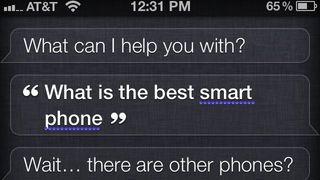Apple filings for AirPlay Mirroring, Siri land in U.S. patent office
A pair of filings this week cover technology already in use with iOS

Even as Apple works to defend existing technology patents in court, the iPhone maker continues to shore up its arsenal with a pair of new applications protecting AirPlay Mirroring and Siri.
CNET reported on Thursday that Apple filed new patent applications with the U.S. Patent and Trademark Office (USPTO) aimed at keeping two of the company's key iOS technologies safe from copycats.
AirPlay Mirroring is covered in the first new patent titled, "Gesture Visualization and Sharing Between Electronic Devices and Remote Displays," with a focus on how one touchscreen-enabled device - in this case, an iPhone, iPod touch or iPad - can replicate its picture and sound to a second display, such as an Apple TV.
The patent appears to cover only the implementation of AirPlay Mirroring on iOS devices, although OS X Mountain Lion now allows the feature to also be used from a Mac, but that use does not appear to be covered with this filing.
Siri in context
The second patent offers additional protection for Siri, the virtual assistant feature first introduced a year ago with the iPhone 4S and finally brought to the third-generation iPad with iOS 6.
Although the primary technology behind Siri was filed with the USPTO several weeks ago, the new application titled, "Using Context Information to Facilitate Processing of Commands In A Virtual Assistant," adds additional protection for how Siri understands what the user is trying to request.
According to Patently Apple, Siri processes context clues, which "helps to clarify the user's intent and to reduce the number of candidate interpretations of the user's input, and reduces the need for the user to provide excessive clarification input."
Get daily insight, inspiration and deals in your inbox
Get the hottest deals available in your inbox plus news, reviews, opinion, analysis and more from the TechRadar team.
The additional patent offers further detail into how Siri uses available search, database, dialog history and more to put a user's request into context.
Although Apple files many patent applications that never see the light of day, the latest pair cover technology already in use with iOS devices.
Via CNET, Patently Apple
